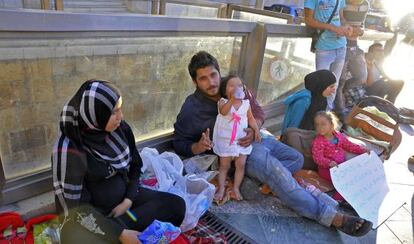"We are happy to be alive but for us Ceuta is a prison we can't escape"
Thirty Syrian refugees are asking Spain to speed up their asylum applications

Kheder Ramadan has spent the last few days camped outside the central government delegate's offices in Ceuta, sleeping under the stars on cardboard while being discreetly watched by the police. With him is his wife, Namat, who is eight months pregnant and can hardly stand up, and his one-year-old daughter Khaldie, who runs around them both in the Spanish exclave's central Plaza de los Reyes. They are all from the Syrian city of Homs, one of the places that has suffered the worst devastation in the ongoing civil war.
The family forms part of a group of 30 Syrian nationals who are being housed at Ceuta's Temporary Center for Immigrants (CETI) and have started a protest to persuade the Spanish authorities to resolve their current situation by prioritizing their asylum applications and transporting them across the Strait of Gibraltar to rebuild their lives. The process often takes months.
"We only ask that they take us to the peninsula, because we cannot live here," says 22-year-old Kheder. He insists that their plight is desperate and that he simply wants to be able to work to restart a future that essentially stopped on November 12, 2012, the date stamped in his daughter's passport. On that day, Kheder led his family away from their home with little more than the clothes in which they stood. "We had nobody left in Syria," he says. His family has been relatively fortunate: the bitter conflict has claimed the life of one of his grandparents but his brother and parents were able to escape and take refuge in Milan.
We only ask that they take us to the peninsula, because we cannot live here"
Kheder was forced to abandon Syria when he refused to return to the army. "We are happy to be alive and to have fled the war, but for us Ceuta is a prison that we can't escape."
His family traveled 5,000 kilometers over a 10-month period to reach Spanish soil. They crossed Lebanon and the entire Maghreb from Egypt to Morocco, but dodge the question of how they gained access to Ceuta. The majority of the group did so using false passports or by hiding in cars.
The Ramadan family has been in the Spanish autonomous city since the middle of September. They are one of three Syrian families who have managed to get on to European soil in the past few months. Among the others is that of Rami Chain and his wife Gazia. They have four children aged 11, eight, five and nine months. Like the rest of the refugees, they want to go to Madrid, where they have friends and family. The third family consists of Ibrahim and his wife Zainab, who gave birth in Ceuta just a few days ago to Kahil, who has two older sisters, Zizo and Tafida.
The three families have been protesting with the rest of their compatriots because they do not wish to stay in the CETI, which is overwhelmed with people following a series of successful assaults on Ceuta's border fence and coasts by African immigrants in recent months. More than 700 people are installed in the CETI, which was designed to hold just over 500. Kheder left the center two weeks ago because he was not allowed to sleep in the same room as his wife and children. "It is not a place for children to live," he says. "We are not complaining about how we have been taken in, but there are too many people, from all over the place, and not all of them are good."
The Syrian refugee community in Ceuta also includes teenagers such as Mustafa Mesto, 17, who fled Aleppo. The rest of his family crossed the border into Turkey.
Tu suscripción se está usando en otro dispositivo
¿Quieres añadir otro usuario a tu suscripción?
Si continúas leyendo en este dispositivo, no se podrá leer en el otro.
FlechaTu suscripción se está usando en otro dispositivo y solo puedes acceder a EL PAÍS desde un dispositivo a la vez.
Si quieres compartir tu cuenta, cambia tu suscripción a la modalidad Premium, así podrás añadir otro usuario. Cada uno accederá con su propia cuenta de email, lo que os permitirá personalizar vuestra experiencia en EL PAÍS.
¿Tienes una suscripción de empresa? Accede aquí para contratar más cuentas.
En el caso de no saber quién está usando tu cuenta, te recomendamos cambiar tu contraseña aquí.
Si decides continuar compartiendo tu cuenta, este mensaje se mostrará en tu dispositivo y en el de la otra persona que está usando tu cuenta de forma indefinida, afectando a tu experiencia de lectura. Puedes consultar aquí los términos y condiciones de la suscripción digital.








































